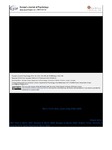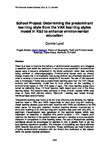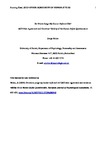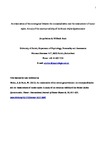The German version of the Humor Styles Questionnaire: Psychometric properties and overlap with other styles of humor

Date
2016-08Author
Subject
Metadata
Show full item recordAbstract
The Humor Styles Questionnaire (HSQ; Martin et al., 2003) is one of the most frequently used questionnaires in humor research and has been adapted to several languages. The HSQ measures four humor styles (affiliative, self-enhancing, aggressive, and self-defeating), which should be adaptive or potentially maladaptive to psychosocial well-being. The present study analyzes the internal consistency, factorial validity, and factorial invariance of the HSQ on the basis of several German-speaking samples combined (total N = 1,101). Separate analyses were conducted for gender (male/female), age groups (16–24, 25–35, >36 years old), and countries (Germany/Switzerland). Internal consistencies were good for the overall sample and the demographic subgroups (.80–.89), with lower values obtained for the aggressive scale (.66–.73). Principal components and confirmatory factor analyses mostly supported the four-factor structure of the HSQ. Weak factorial invariance was found across gender and age groups, while strong factorial invariance was supported across countries. Two subsamples also provided self-ratings on ten styles of humorous conduct (n = 344) and of eight comic styles (n = 285). The four HSQ scales showed small to large correlations to the styles of humorous conduct (-.54 to .65) and small to medium correlations to the comic styles (-.27 to .42). The HSQ shared on average 27.5–35.0% of the variance with the styles of humorous conduct and 13.0–15.0% of the variance with the comic styles. Thus–despite similar labels–these styles of humorous conduct and comic styles differed from the HSQ humor styles.
Collections
Publisher
Place of Publication
Journal
Volume
Issue
Pagination
Author URL
Recommended, similar items
The following license files are associated with this item:
Related items
Showing items related by title, author, creator and subject.
-
School Project: Determining the predominant learning style from the VAK learning styles model in KS2 to enhance environmental education
Land, C. (University of Plymouth, 2013)There is a need to improve the delivery of environmental education as it struggles to establish itself within the curriculum, it would be more beneficial if environmental issues were to become embedded in the whole ... -
Do Others Judge My Humor Style as I Do? Self-Other Agreement and Construct Validity of the Humor Styles Questionnaire
Heintz, Sonja (Hogrefe Publishing Group, 2019-09)<jats:p> Abstract. Humor research has intensified in psychology over the last two decades, with the Humor Styles Questionnaire (HSQ) being the most prevalent measure. Still, the construct validity of its four scales ... -
An examination of the convergence between the conceptualization and the measurement of humor styles: A study of the construct validity of the Humor Styles Questionnaire
Heintz, Sonja; Ruch, W (Walter de Gruyter GmbH, 2015-10-15)<jats:title>Abstract</jats:title><jats:p>The Humor Styles Questionnaire (HSQ;</jats:p>




